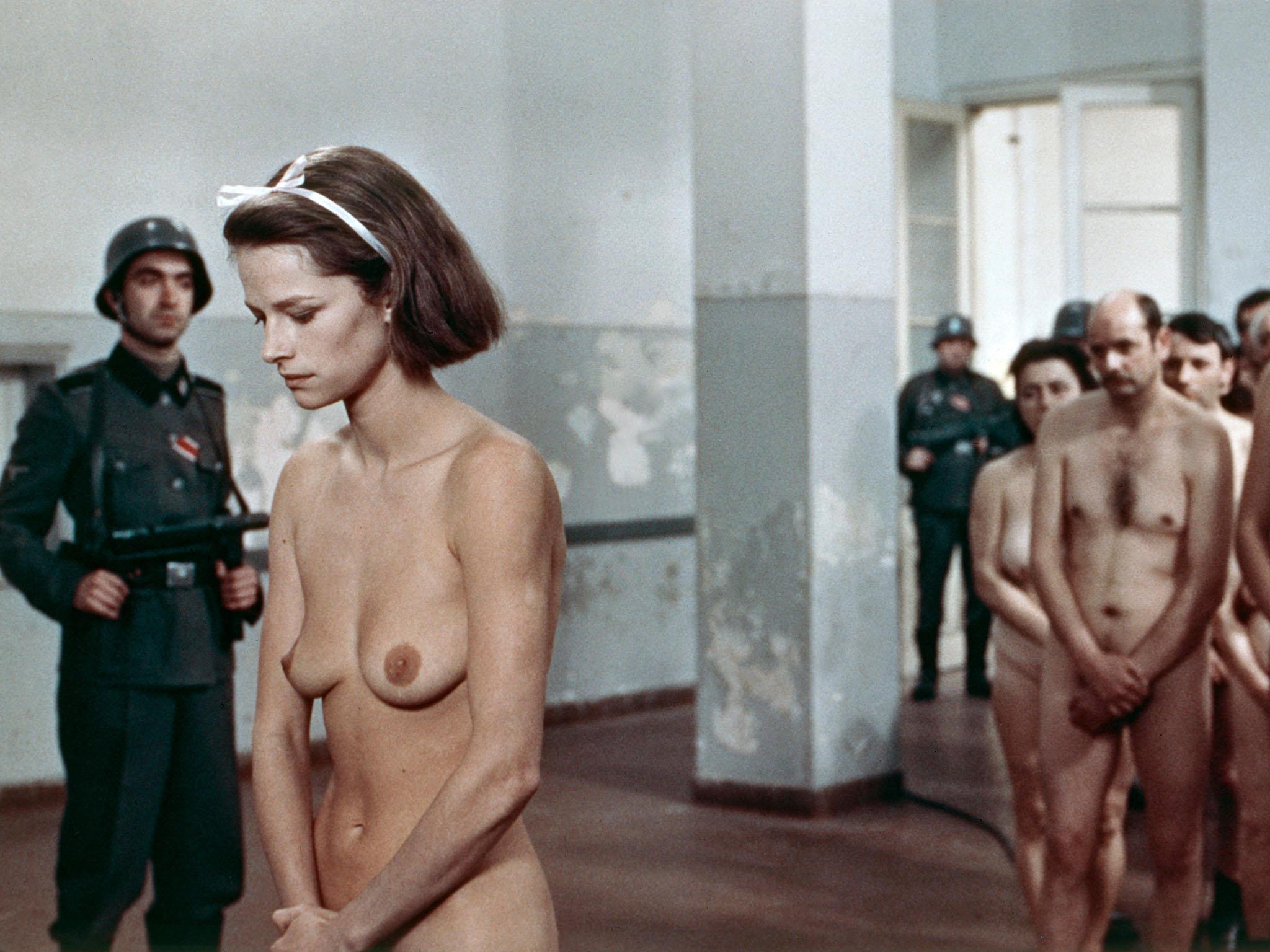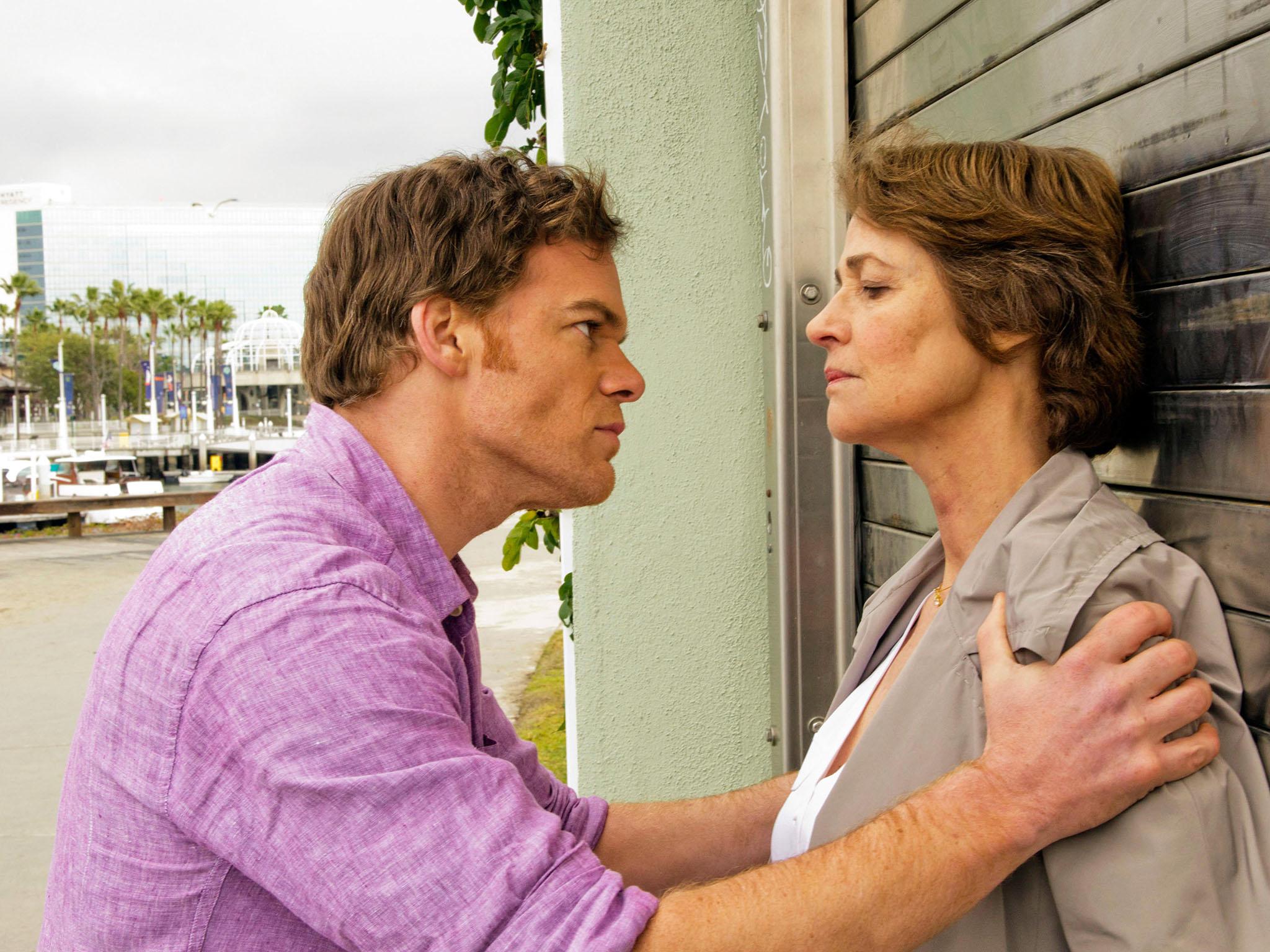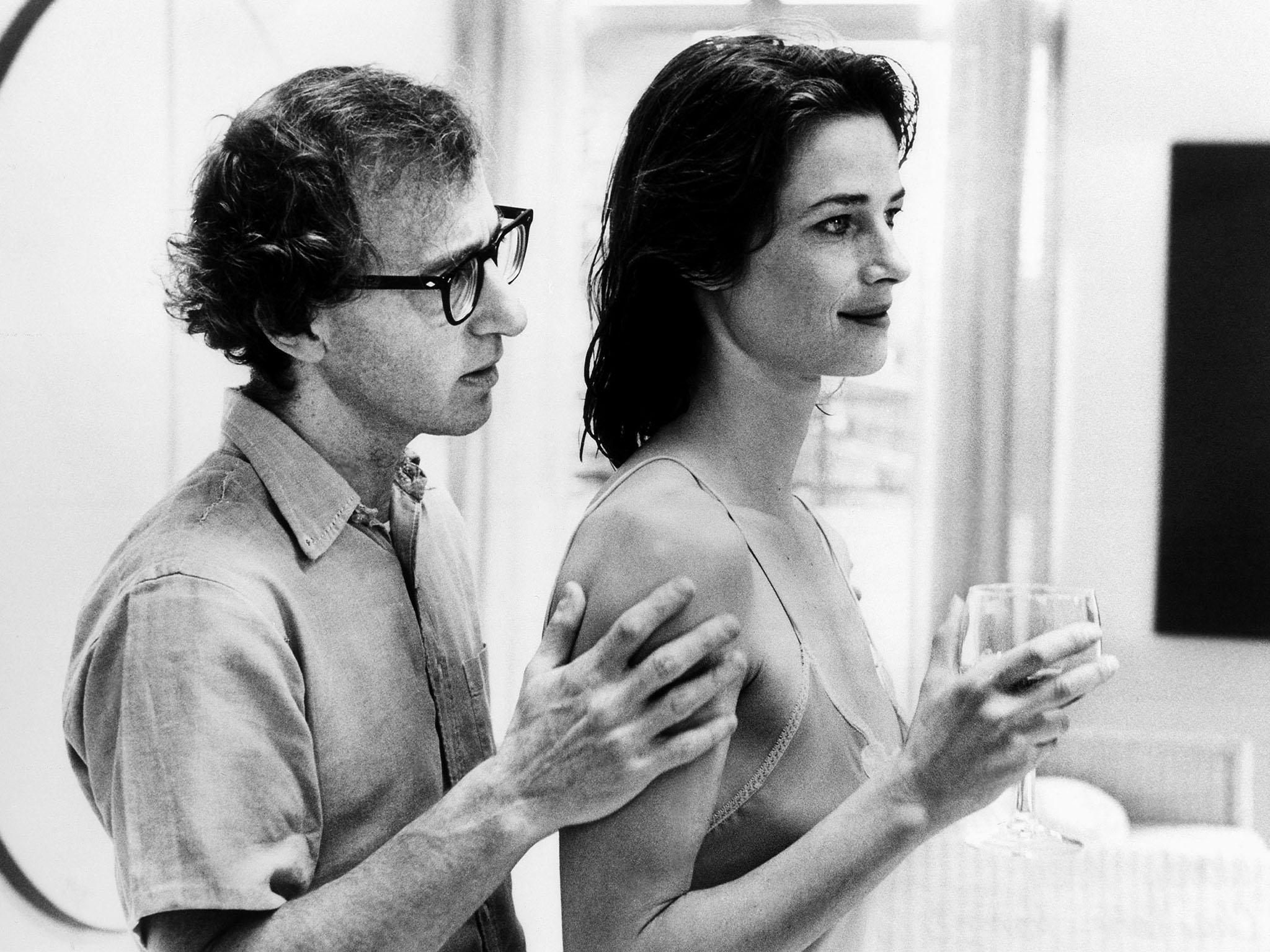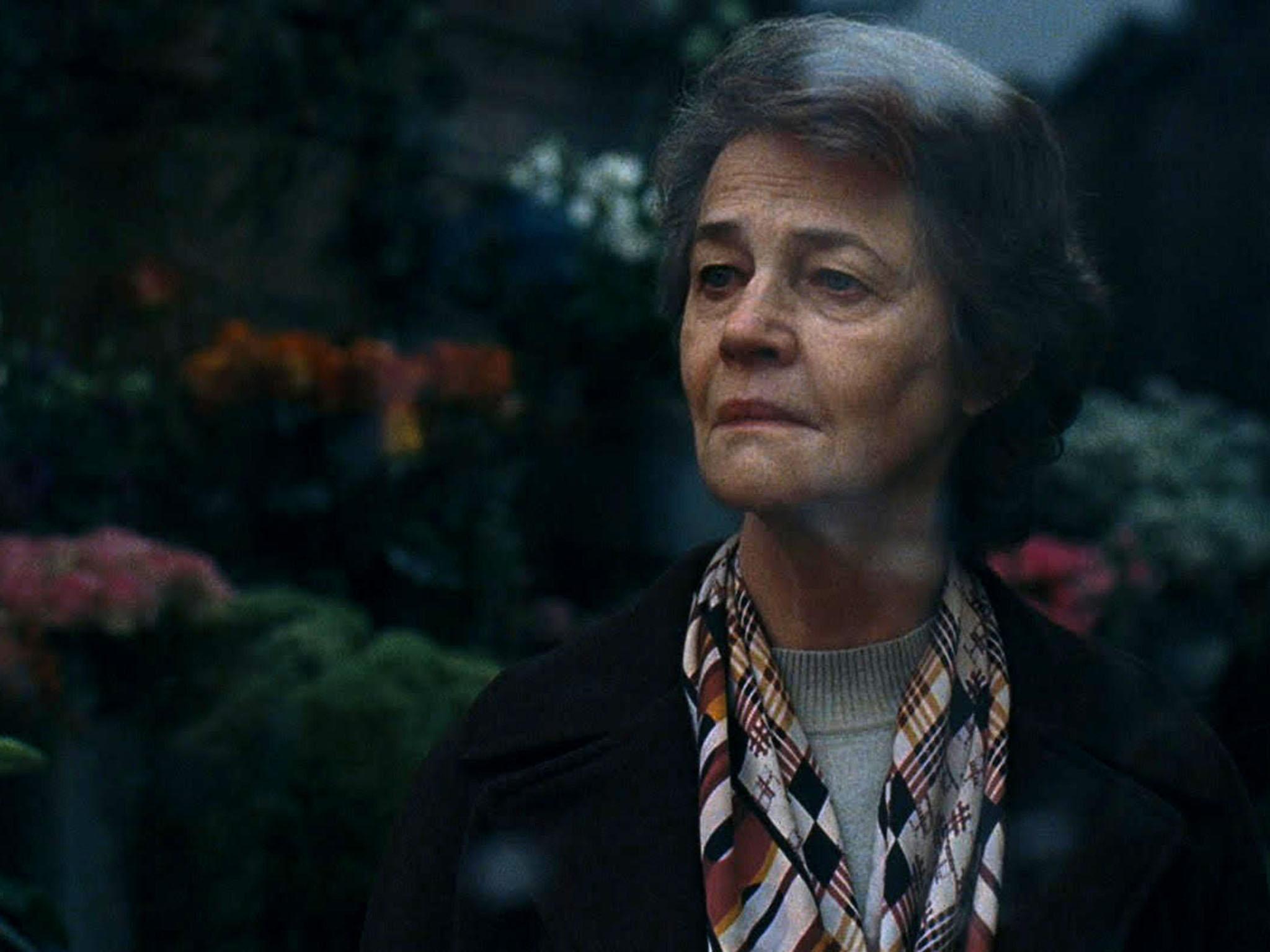Red Sparrow’s Charlotte Rampling interview: ‘Jennifer Lawrence is in a film world that I am not in, which is the big machine’
Rampling stars as a headmistress who teaches a former prima ballerina, Jennifer Lawrence, how to become a seductive Russian spy in ‘Red Sparrow’

Charlotte Rampling is standing by the window of a conference suite high up in a hotel in Rotterdam, looking down on the city below. The actor (star of such films as The Night Porter, The Damned, Max Mon Amour and Stardust Memories) is at the International Film Festival Rotterdam for the screening of her new film, Andrea Pallaoro’s Hannah, and to give a masterclass.
Rampling is back on British screens this week, in the big budget Hollywood movie Red Sparrow, as the cold-as-ice “headmistress” who tutors a former prima ballerina (Jennifer Lawrence) on how to become a seductive Russian spy.
Rampling describes the film as “quite a trip”, and also expresses her admiration for Lawrence.
“She [Jennifer Lawrence] is in a film world that I am not in, which is the big machine. When she decided to do Hunger Games, she realised she was going into a very big world – and you don’t probably realise how big that is. But she has remained...” she searches for the right phrase before landing on: “very sweet.”

“The problem is about how you keep that; how do you keep yourself within a world like that, because it is so big. She is the highest paid female actor, and these are huge productions. She is constantly surrounded by people… she is the girl in the middle of it all. I am not pitying her, but I am saying I hope she is able to have another life as well.”
Early in her career Rampling was herself the “girl in the middle of it all”. When she played the Holocaust survivor reunited in a twisted romance with the Nazi officer (Dirk Bogarde) who had tortured her, in Liliana Cavani’s The Night Porter (1974), she became one of the most talked about stars of her era, just as Jennifer Lawrence is today.
The New York Times called The Night Porter a “a slab of opulent claptrap” and a “piece of junk”; Roger Ebert proclaimed it as “nasty as it is lubricious”; Pauline Kael in The New Yorker found it “humanly and aesthetically offensive”, and another New York critic labelled it “slick, demented junk”.
Cavani’s defence was that her film was based on real characters. She had interviewed women who were active in the Italian resistance and had been sent to the camps. One, a teacher, was taken to Dachau when she was 18. She survived but was traumatised by her experience. What startled Cavani was the woman’s admission that she returned to Dachau every year.

Another, a survivor of Auschwitz, told Cavani: “I will never forgive the Germans for forcing me to see a side of myself I didn’t know existed.” The woman had managed to stay alive by “only thinking about herself and without thinking of the others”, and had subsequently felt deep shame about her selfishness. The point Cavani wanted to make in The Night Porter was that survivors’ stories “can sometimes be controversial, they can be dark”.
Rampling doesn’t hide her continuing pride in what remains the most controversial film of her long and distinguished career. At her masterclass the day before my interview, she had told her audience that, as an actor, she relies on her “instincts” and never “thinks of the consequences”. She took on The Night Porter simply because she was amazed by the screenplay. Dirk Bogarde, with whom she had worked on The Damned, had suggested that Cavani send it to her. For Rampling, the film is a love story rather than an analysis of Nazi guilt. “There was great beauty in it, really great beauty. It was a tortured, strange, decadent love story.”

Watch Apple TV+ free for 7 day
New subscribers only. £8.99/mo. after free trial. Plan auto-renews until cancelled.
ADVERTISEMENT. If you sign up to this service we will earn commission. This revenue helps to fund journalism across The Independent.

Watch Apple TV+ free for 7 day
New subscribers only. £8.99/mo. after free trial. Plan auto-renews until cancelled.
ADVERTISEMENT. If you sign up to this service we will earn commission. This revenue helps to fund journalism across The Independent.
Rampling and Cavani “fell out” when the actor declined to work on the director’s next film, Beyond Good and Evil, about the relationship between philosopher Nietzsche and the Russian writer and psychoanalyst, Lou Andreas-Salomé. “She [Cavani] was heartbroken that I didn’t do it, but I couldn’t. I was too tired.” They were eventually reconciled and The Night Porter is still probably the film that defines Rampling’s career. She has played many other memorable roles, for example opposite a very hirsute Sean Connery in Zardoz, or as the near perfect woman in Woody Allen’s Stardust Memories. She enjoyed a second coming as a movie actor when she started working with François Ozon in films like Under the Sand (2000) and Swimming Pool (2003), and in Laurent Cantet’s Heading South (2005).
In many ways, though, her career is the complete antithesis of that of her Red Sparrow co-star Jennifer Lawrence. Having appeared in films set in swinging London in the 1960s, she went off to Italy and became a star in European art house movies like The Damned and The Night Porter, not in big US studio movies. She later married composer Jean-Michel Jarre and started living in France, where she is still based. “It made a big difference to what kind of films I was going to make and where I was going to go. I was really on the continent. I wasn’t part of England any more… and, at that time, French cinema was much more flourishing than English cinema.”

Over the years Rampling has worked with her share of American directors (everyone from Sidney Lumet and Woody Allen to Todd Solondz) but always on a very selective basis. “I didn’t want to be doing something fake,” is how she describes the choices she makes. “Somehow, in Hollywood, it felt very fake.”
At the same time, she is very gratified that after she appeared in high-profile US TV series Dexter, young people “discovered” her. “They didn’t know who I was but through Dexter they saw, and then they looked at my filmography and would start to look at my films and would discover a whole other world.”
No one does chilliness and inner suffering quite like Rampling. Her character in Hannah, the film that premiered in Rotterdam, is very similar to many others she has played recently – a lonely, traumatised woman trying to cope with her husband’s sudden imprisonment.
“It is the family of people I do tend to be very attracted by in cinema. It’s the kind of cinema that I’ve always wanted to make, so when they [these kind of roles] come up, I will always go for it. It’s not a cinema that’s very gay and entertaining, but it is a cinema that is very engaged psychologically. It’s a cinema about how we feel inside us as human beings and how we can show that with as little action as possible.”

Hannah follows on from her divorcee looking for love but who becomes embroiled in a murder-mystery in I, Anna (2012), and the seemingly happily married wife who discovers a secret long buried in her husband’s past in 45 Years (2015), or indeed the Miss Havisham she played in a celebrated TV adaptation of Great Expectations (1999).
Ask Rampling if playing such demanding roles is gruelling and she suggests quite the opposite.
“As I join these characters and choose to play them, it’s not an exorcism but it’s a kind of accompaniment to what I go through a lot of the time because I am a very complex person and I have a lot of things churning away inside me,” she declares of being able to express such raw emotion on screen. “It is almost like a relief.”
We will see Rampling later this year in Lenny Abrahamson’s film version of the eerie Sarah Waters novel, The Little Stranger, a film she describes as being not so much a haunted house film as a story about the “ghost inside ourselves”.
In her life as well as her films, Rampling always gives the impression of looking inwards. Last year she wrote an “autobiography”, Who I Am, coauthored with Christophe Bataille and published to mixed reviews. This wasn’t the typical showbiz memoir but more a stream of consciousness meditation – in some ways, a study of the ghost inside her.
“It found its own form in its own way. At one stage I said this is it, this is me – that’s why I called it Who I Am. I said this is it. It is my first 20 years and that is how I want people to think of me and remember me.”
Rampling is a strange mixture of openness and guardedness. She speaks frankly about the suicide of her sister, the grief it caused her, and how working on Ozon’s Under the Sand finally, many years later, helped her deal with it. At the same time, she is reluctant to be drawn on such topical issues as the Me Too Movement. (When she gave a radio interview during the Oscar campaign for 45 Years, her loose comments about race and the Academy Awards plunged her into a storm of controversy. She believes the ensuing negative publicity may have affected her awards chances.)
Rampling explains that she is extremely wary about being misinterpreted. “It chills me,” she says of the way remarks or soundbites taken out of context can now immediately be splashed over the internet. When she was giving interviews earlier in her career, she could speak far more frankly. “I am constantly censoring myself, which is such a pity. There are lots of things I would love to say and talk about but I don’t do it that way any more now,” she closes the conversation on a typically tantalising and enigmatic note.
Rampling was interviewed at International Film Festival Rotterdam, IFFR.COM. ‘Red Sparrow’ is out now. ‘The Little Stranger’ will be released later this year.
Join our commenting forum
Join thought-provoking conversations, follow other Independent readers and see their replies
Comments